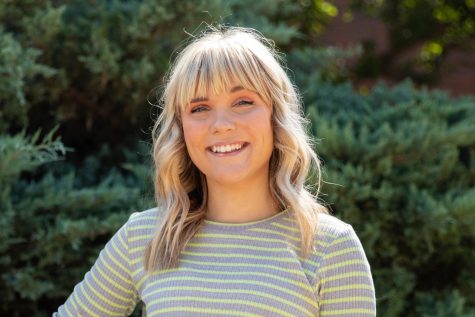New psychology chair aims to highlight department
Nithin Reddy Nagupaur / The Sunflower
C. Brendan Clark, psychology associate professor and chair, works in his office on Sept. 1.
When C. Brendan Clark first interviewed for an assistant professor position, he said he admired the people in the department — oftentimes working hard to benefit others while receiving little recognition.
Now as department chair, he wants to continue the mission that the department already started.
“It probably sounds a bit sentimental, but what I would like to do is highlight the things that compelled me to come to WSU in the first place,” Clark said in an email to The Sunflower.
Mental health has been a topic for much discussion, especially tying it into the COVID-19 pandemic and the impacts of isolation on personal health. But mental health as a discussion is not something new.
“It certainly increased the prevalence of several forms of mental illness, but I think it was more of a breaking point towards something we have been moving towards for some time as opposed to a fundamental social change,” he said.
Clark said as chair he wants to serve as a people connector, bringing more awareness to psychology and mental health as a whole.
“There are just so many passionate people both in this department and across the university who care about mental health and promoting awareness about psychology. I’d like to do everything I can to bring these together and coordinate efforts,” he said.
There are three main points Clark wants to focus on in the department: train future therapists in the most up-to-date mental health treatments, create flexible and technologically savvy clinicians, and bring identity into the department.
Senior psychology student Hannah Prios first met Clark her freshman year. She said she was thrilled when Clark was named department chair.
“I think he is going to be able to make some really awesome things happen in this department,” Prios said.
Prios said the top priority should be building community within the department.
“Ever since COVID there’s been kind of a loss of that,” Prios said. “I think especially in a career like psychology making connections is really important.”
As for what educational path psychology students should take, Clark said there is no one correct answer.
“My heart really goes out to students today,” Clark said. “The world has gotten so competitive and the field of psychology has become so broad I don’t think there is any one piece of advice that will apply to every career path.
The first step, however, is to decide what part of psychology a student is interested in. Prios said her biggest advice to new psychology students is to join the psychology club.
“If students are interested in psychology they need to get involved in research and psychology related [to] campus organizations early in their college career to determine what aspects of psychology interest them,” Clark said.
Prios said connections are what the department is all about.
“During my freshman year, I kind of just networked and connected with different people in the psychology department,” Prios said. “That led me to meeting some people like Dr. Clark … and by networking and meeting these people in the psychology department, I’ve been able to do research and connect with graduate students.”
Through these connections, Prio was able to get a job at the KU Medical Center as a psychometrist.
“These are experiences I’m super grateful for that I probably honestly wouldn’t have been able to take part in if I didn’t go to WSU,” she said.
It’s not lost on Prios that the pandemic has changed the way people live their everyday lives. She realized the importance of majors like psychology during trying times like these.
“It definitely made me realize that there will always be a need for mental health related careers,” she said. “I definitely think that psychology will always be imperative because no matter how much we advance as a society, we’ll always have human emotion.”

Lindsay Smith is the former editor-in-chief and newsletter editor for The Sunflower. Smith was a journalism major at Wichita State with a minor in creative...













